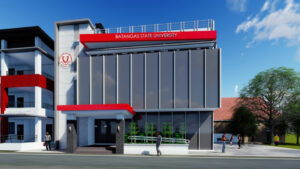THE Philippine Economic Zone Authority (PEZA) and the Department of Science and Technology (DoST) signed an agreement outlining the preferred research activities and incentives on offer for schools seeking to register as knowledge, innovation, science, and technology (KIST) economic zones.
At a briefing in Taguig City on Thursday, PEZA Director General Tereso O. Panga and Science and Technology Secretary Renato U. Solidum, Jr. signed a joint memorandum circular (JMC) setting the rules for higher education institutions (HEI) seeking KIST status.
“KIST parks will play a significant role in increasing research and development infrastructure, fostering collaboration in research and development with foreign partners, facilitating technology transfer, and upskilling our workforce towards innovation. Together with the DoST, we can do a lot to boost our knowledge and technology inputs-outputs towards enhancing our global invocation index ranking,” Mr. Panga said.
According to Mr. Panga, the first KIST park arose in Batangas State University, which was proclaimed by then President Rodrigo R. Duterte in 2020.
He said the PEZA board has since approved three KIST park registrations that are awaiting proclamation from President Ferdinand R. Marcos, Jr.
“These are the De La Salle University Innovation Hub located in Biñan, Laguna; AltaHub at the University of Perpetual Help in Bacoor, Cavite; and the Lyceum of the Philippines-Laguna KIST Park,” Mr. Panga said.
Mr. Panga said that another HEI looking to register as a KIST ecozone is Catanduanes State University.
The JMC set the size requirement for KISTs at 5,000 square meters (sq.m.) of contiguous land ecozones in the National Capital Region (NCR) and other metropolitan areas. Outside of the NCR and other metropolitan areas, the minimum is 10,000 sq.m.
The minimum gross floor area for KIST facilities is 10,000 sq.m. in the NCR and other metropolitan areas. Outside these areas, the minimum is 5,000 sq.m.
The JMC said KIST ecozones must engage in preferred activities like research and development in biotechnology, food and nutrition, agriculture, engineering, electronics, robotics, renewable energy, transport solutions, data analytics, artificial intelligence, or any other such priority area determined by the DoST.
The incentives available to KIST export locators include income tax holidays, a special corporate income tax, and value-added tax zero rating on local purchases and exemption on imports.
“Through KIST parks, we aim to foster the production of a diverse array of unique products and services, utilizing our indigenous materials and talent,” Mr. Panga said. — Revin Mikhael D. Ochave

